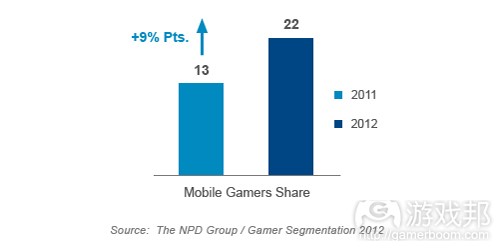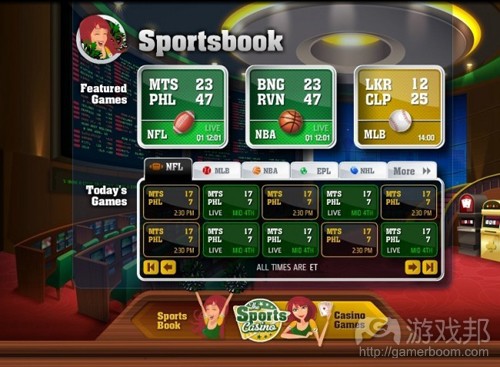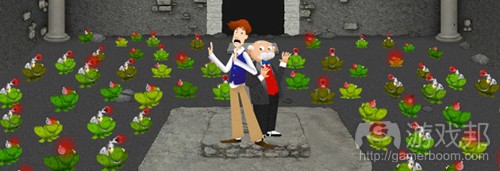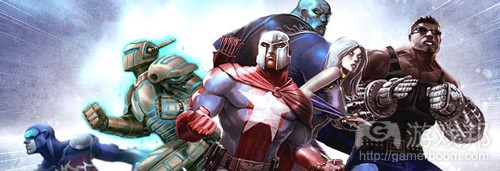每日观察:关注Jesse Schell首个大众设计游戏项目(9.6)
1)NPD Group最近报告显示,除了手机和可下载/在线游戏领域之外,美国其他各类电子游戏玩家数量都在缩水。
该报告指出,2012年美国电子游戏玩家总数达2.115亿人,约占该国人口的三分之二,但比2011年时减少了1200万左右(减少5%);NPD所调查的对象包括硬核主机游戏、PC游戏、家庭和儿童游戏玩家。其缩水最严重的当属儿童游戏玩家,其数量降少了1740万左右。
但数字游戏(包括可下载及在线游戏)和手机游戏玩家增长却极为迅速,手机游戏玩家在所有游戏用户中占比22%,增长9个百分点。
但硬核主机游戏玩家的消费比例仍然高于其他游戏用户,在过去3个月中的平均消费额为65美元,而其他各类游戏消费者平均花费是48美元(数字游戏玩家平均消费16美元)。
2)据games.com报道,Zynga日前宣布将于本周向Facebook和Zynga.com发布《FarmVille》续集游戏,其设计总监Wright Bagwell表示,《FarmVille 2》独立于原版游戏的新产品,他们并不希望用这个新游戏取代原版《FarmVille》。
《FarmVille 2》最大的变化是图像效果,它采用全新的3D引擎制作而成,玩家在游戏中的物品、人物和动物之上移动鼠标时,这些对象都会产生回应,例如庄稼会在屏幕上窸窣作响,椅子会前后晃动,动物及人物则会与玩家对视。
该游戏还采用Flash 11增加控制方式的深度,使如使用空格键翻转物体及执行正确的点击功能。最重要的是,游戏移除了能量机制,玩家只要拥有足够的物质就可以在游戏中随心所欲地执行操作。
《FarmVille 2》是自《Mafia Wars》问世之后,Zynga发布的首个续集游戏。《Mafia Wars 2》于2011年10月上线,并迅速达到280万DAU的峰值。但到2011年12月,该游戏DAU已降至100万以下,目前仅为5万左右。这次失败被该公司首席执行官Mark Pincus视为“学习经验”。
原版《FarmVille》目前仍是Facebook第十大热门游戏,拥有390万DAU;而原版《Mafia Wars》则在续集问世时就淡出了大众视线,目前DAU不足100万。
3)据gamasutra报道,Zynga近日宣布与体育投注游戏公司RocketPlay合作,将向Facebook和Zynga.com平台发行后者推出的投注游戏《Sports Casino》,为玩家提供真正的虚拟体育博彩游戏体验(游戏邦注:Facebook平台在上个月已出现首款玩真钱的赌博游戏)。
Zynga最近积极介入在线博彩领域的表现还包括聘请Maytal Ginzburg Olsha(真钱赌博网站888.com网站前高级副总裁)担任公司首席运营官。
4)据gamasutra报道,游戏设计师Jesse Schell在最近采访中表示,他针对所有人都喜欢玩游戏,但并非人人都能制作游戏这一问题,推出了《Puzzle Clubhouse》这款由大众参与设计的在线游戏(游戏邦注:该项目在今年初成功突破了在Kickstarter平台集资1万美元的目标)。
该项目允许在线社区创造游戏内容,以及投票决定游戏的相关设计(例如角色命名,核心机制等),而Schell团队则负责处理技术方面的内容,根据大众意见将游戏打造成形。
该游戏第一章节《Laz0r Fr0gz!!!!!!!!1》已经在本周发布,其游戏理念来自社坛成员“madmik3”。完整版本游戏将让多数玩家在20分钟以完成13个迷宫关卡,并再用15分钟应对最后一个棘手的关卡。
Schell表示这个试验获得了成功,游戏由《Puzzle Clubhouse》忠实粉丝合力制造完成,但目前最大的问题是如何解决更多人参与设计时的决策平衡问题。
这款游戏采用免费增值模式,用户可以免费投票支持某项设计,但只有注册付费用户(需支付19.95美元年费)的玩家能够向开发团队提交自己的内容和想法,除此之外他们在实际投票过程中也将享有更多话语权。
5)据serkantoto报道,日本社交游戏公司GREE日前宣布,将于10月31日正式关闭了另一款第一方游戏项目《Majin Kingdom》,从9月28日起玩家将不可再购买游戏中的gacha付费道具。
这是继7月份停止运营《Bakumatsu Kingdom》和《Sangokushi Kingdom》之后,GREE关闭的第三款Kindom系列游戏。值得注意的是,GREE在两周前才刚关闭了另一款第一方社交RPG游戏《Dragon Master》。
6)据Techcrunch报道,Facebook日前宣布取消二次发售股票计划,将以现金支付其受限股票的税费(游戏邦注:Facebook原先的S-1文件曾指出,计划在二次发行中出售多达1.22亿只股票,以便解决原先受限股票的税费问题)。
该公司首席执行官Mark Zuckerberg还通过SEC文件表示,自己不会在一年内出售自己持有的股票。与此同时,董事会成员Marc Andreessen和Don Graham将出售部分股票以付税,但暂无出售其余股票的打算;出售部分支付税费的股票后,前者还剩余0.25%股权,后者则将保留77万只限制性股票。
该消息公布后,Facebook股价一度反弹1.98%,达到每股18.08美元。但观察者认为Facebook股市行情究竟如何,只有10月23日该公司发布第三季度财报结果,以及10月29日结束员工股票封锁期时才能见分晓。
7)据gamaustra报道,NCsoft将关闭位于加州的MMORPG开发商Paragon Studios及其主打游戏《City of Heroes》,并将公司重心转向发行业务。
Paragon Studios成立已有5年(原名为NCsoft NorCal,于2009年更名为Paragon Studios),该团队主要接管NCsoft从Cryptic Studios收购的《City of Heroes》这款游戏运营业务。
《City of Heroes》于2004年发布时是3D MMORPG游戏中的出色代表之一,在2011年6月该游戏从订阅模式转为免费增值模式以扩大用户规模。但NCsoft现在已叫停该项目开发业务,并将在今年底前关闭游戏。据知情者透露,此举或将导致其团队裁员80人。(本文为游戏邦/gamerboom.com编译,拒绝任何不保留版权的转载,如需转载请联系:游戏邦)
1)America’s gamer population is shrinking
By Eric Caoili
The number of people playing video games in the U.S. is declining due to shrinking audiences in every gamer segment except for mobile and downloadable/online, according to the NPD Group.
Gamer Segmentation 2012: The New Faces of Gamers, the market research firm’s latest report, estimates that 211.5 million people in the U.S. are playing video games in 2012 — that’s around two-thirds of the country’s population, but close to 12 million fewer (5 percent less) than in 2011.
Most gamer segments that NPD tracked have contracted: core console gamers, light PC gamers, avid PC gamers, and family and kid gamers — the last category took the biggest hit, shrinking by 17.4 million players.
However, the digital gamers (those playing downloadable and online titles) and mobile gamers segments grew significantly. The mobile category now makes up the largest out of all the groups, gaining 9 percentage points and taking 22 percent of the total share, edging out core console gamers.
NPD analyst Anita Frazier says these shifts in the gamer segments aren’t surprising, considering the longer life cycles of the current home console generation, and the increasing installed base of smartphones and tablets.
The changes come at a cost for the industry, though — NPD notes that core console gamers spent more on retail titles than any other segment in the last three months, an average of $65, compared to a $48 average across all game purchasers (and $16 for those buying digital titles). (source:gamasutra)
2)Here’s the skinny on FarmVille 2
Mike Thompson
After officially announcing FarmVille 2 at June’s Zynga Unleashed event, Zynga is finally gearing up to release the game this week. We sat down for a hands-off preview of the game with VP of Games Tim LeTourneau and the game’s Director of Design Wright Bagwell.
According to LeTourneau, the central concept behind FarmVille 2 was, “If you were going to make FarmVille today, what would it look like and how would it play?” Bagwell notes the game’s design team is built of several veterans from the traditional video game industry, and FarmVille 2 was designed in order to create a social game they’d enjoy playing.
Upgrades galore
The most immediate upgrade to the game is its visual presentation. As opposed to other social games from the developer, FarmVille 2′s sporting a brand new 3D engine. As soon as the game begins, players can see dynamic effects in action like grass waving all over the screen. Likewise, moving the mouse over items, people and animals will generate a reaction; examples of this included rustling crops on the screen, causing a chair to rock back and forth and getting animals and characters to look up at the player.
Meanwhile, LeTourneau and Wright point out the user interface is much easier to use thanks to the game’s new “painting” system. This takes the place of clicking on individual squares on the game map when a player wants to do the same activity over and over again; instead, a user can click on a single square and then drag their mouse over multiple others. Once this is done, the player’s avatar will go to work. Zynga also made use of Flash 11 to add depth to the controls, like using the spacebar to rotate items for placement and enabling a right click feature.
Mixing new gameplay in with the old
The farm-sim gameplay will feel immediately familiar to anyone who’s played the original FarmVille or similar games over the past few years, including the usual planting, nurturing and harvesting mechanics, as well as clearing plots of land in order to expand one’s property. However, Zynga has incorporated a number of new elements into the sequel to make the game feel fresh.
First of all, the game eschews energy mechanics entirely: So long as players have the necessary raw materials (like feed for the animals or water and fertilizer for plants), they can work their farm for as long as they like. The game’s ecosystem makes everything interconnected: In order to make feed, crops have to be harvested and ground up; the feed is fed to animals on the farm, which then generates things like fertilizer, milk and eggs; these materials are used to craft items like pies and scones; the food can then be sold at a player’s roadside stand.
There’s also a village grocer who will show up and provide players with a “To Do” list of crops he would like harvested, based on the types of crops they are growing. This list is customized and unique to each player, containing three tasks of increasing difficulty.
The game’s social mechanics are, for the moment, the usual set seen in these types of games. Players can visit friends’ farms and perform duties in exchange for virtual goods. Also, Facebook friends can be recruited to work on a player’s farm. When we saw this in use, it was as simple as picking up one of these friends’ characters and dropping them onto a set of crops in order to assist with the farming. However, LeTourneau and Wright say there are plans to take the village sitting in the background of the game’s canvas and turn it into a social hub but are unable to provide us with specifics right now.
Learning from the past
FarmVille 2 is the first major sequel for Zynga since Mafia Wars 2, which bombed shortly after its launch. Mafia Wars 2 launched in October 2011 and quickly peaked with 2.8 million daily active users. By December 2011, the game was already down to under a million DAU, and now it’s sitting at the 50,000 DAU mark. This failure was called out during Zynga’s last earnings call, and CEO Mark Pincus called it “a learning experience.”
In this case, though, Zynga’s starting on surer footing. FarmVille is the game Zynga is generally associated with; likewise, even though it’s one of the company’s older titles, FarmVille is still the No. 10 game on Facebook with 3.9 million DAU. By comparison, Mafia Wars was already on its way out from the public eye when its sequel launched, itself with fewer than a million DAU.
Additionally, FarmVille 2 is launching in far more territories than its predecessor did (FarmVille was originally only available in English). The sequel will be localized for various regions and will launch with an Arabic-language version. Until now, FunPlus Games’s المزرعة السعيدة (“Happy Farm”) has been the most successful farming sim with 2 million DAU. With FarmVille 2 coming to this market, it’s very possible Zynga have its game dominating it in a matter of days, based on the success seen when it turns cross-promotion for a specific game on.
FarmVille 2 is launching on both Facebook and Zynga’s own platform, Zynga.com.(source:insidesocialgames)
3)Zynga backs sports-betting game Sports Casino
By Mike Rose
Zynga made its move into the social gambling market a couple of months ago. With today’s announcement that it has partnered with sports-betting game company RocketPlay, the social giant is looking to turn its online betting services up a notch.
RocketPlay has launched Sports Casino, a new betting title that aims to provide players with an authentic virtual sports gambling experience, via Facebook and Zynga.com. The first real-money gambling game for Facebook launched just last month.
Zynga is following suit and putting a lot of faith in its online gambling exploits — most recently, the company hired Maytal Ginzburg Olsha, previously SVP of corporate and regulated markets for real-money gambling site 888.com, to take on the role of COO of new markets at Zynga.(source:gamasutra)
4)The first crowd-designed video game has frogs, lasers and hats
By Frank Cifaldi
Jesse Schell’s grand scheme for crowd-designed video games started with a simple observation: Just about everyone who loves playing games would like to make them, but few know how.
“It’s like starting a band,” Schell, who leads the team at Schell Games told us last year. “It’s very hard to do by yourself.”
Schell’s solution is called Puzzle Clubhouse, an episodic, crowd-designed monthly series of online games that successfully surpassed a modest $10,000 Kickstarter goal earlier this year. With an online community creating and voting on pieces as small as a character’s name to as substantial as the core mechanics, contributors do all of the fun stuff while Schell’s staff does the technical work of putting the actual games together.
The first episode, Laz0r Fr0gz!!!!!!!!1, launched this weekend. The game concept was contributed by forum member “madmik3,” whose notes included “OMG Those frogs got lasers.” A hat-throwing mechanic was contributed by user “palenoue.”
Other contributions included a cute joke during the ending cinematic and the name of an environment. The full game should take most players less than 20 minutes to complete its 13 overhead maze levels, give or take another 15 minutes or so for those stuck on the tricky (though ultimately very clever) final level.
The experiment was a success: a game managed to be crowd-designed by Puzzle Clubhouse’s modest community, using simple forums software.
“The big question is, how does it scale?” Schell asked when I caught up with him showing off the game in Seattle this weekend, wearing a fez and juggling bowling pins to attract passersby. “If we get thousands of people to participate, can we still make that work?”
Schell and his team compare the development process to improv comedy, where crowd-contributed ideas are made funny by the professional comedians on stage.
“The audience feels a part of it. When you have this balance between participation from the audience and some professionals who know how to hammer it into shape and make it as good as it can be, we think that’s a really good balance. And no one’s done that in games before.”
The game is being monetized in what is surely a unique way. The games are free to play, and voting on content can also be done at no cost. But only those signing up as paid members ($19.95 a year) can submit content and ideas. Paying members also have a louder voice in the actual voting process.
“It’s an experimental model,” Schell says.
“We’ll see if it works.” (source:gamasutra)
5)Majin Kingdom: GREE Shuts Down Another 1st-Party Game [Social Games]
by Dr. Serkan Toto
It seems like GREE‘s housecleaning wasn’t over: the company is shutting down yet another one of their first-party games, social card battle game Majin Kingdom.
In the fantasy title, players enter a “Summons School”, collect God/Devil/Hero cards, team up with other “students”, and battle against various monsters.
GREE announced that players won’t be able to buy premium gacha from September 28 and that Majin Kingdom will be removed entirely on October 31.
It’s the third game in GREE’s “Kingdom” series that gets the axe in a matter of weeks: the company closed down Bakumatsu Kingdom and Sangokushi Kingdom in July.
Yet another GREE first-party game, social RPG Dragon Master, was shut down two weeks ago.(source:serkantoto)
6)Facebook Cancels Secondary Offering, Zuck And Board Members Won’t Sell To Keep Shares Off The Market
Josh Constine
With its share price ailing, Facebook doesn’t want to flood the market with any more stock, so it has cancelled its secondary offering and will instead pay for taxes on its RSUs with cash as detailed in an 8-K filed with the SEC today. Also, CEO Mark Zuckerberg has informed the SEC he has no plans to sell any of his stock in the next year. Meanwhile, board members Marc Andreessen and Don Graham will sell some to cover taxes but beyond that “have no present intention to sell any shares”.
Along with allowing employees to sell up to 234 million shares two weeks sooner than the original November 14th lockup expiration date when the other 777 million go free, today’s announcement will let Facebook get the lockup over with sooner, avoid a secondary sale or big shareholder dump from hurting its share price, and finally get back to business.
In Facebook’s original S-1, it had given itself leeway to sell up to 122 million shares to the public market in a secondary offering to pay for taxes involved in settling the distribution of pre-2011 RSUs. Later it planned to sell 101 million shares to cover these taxes. But now with its share price so volatile, it’s chosen to scrap the secondary offering and spend some of the $10 billion it raised through the high-priced and divisive IPO to pay these taxes in cash.
Zuckerberg’s commitment alone will ensure none of his remaining “444 million shares of Class B common stock as well as 60 million shares of Class B common stock issuable upon the exercise of an option” will reach the market any time soon. He would need to file with SEC well in advance if he wanted to release any of his stake.
Meanwhile, after selling some shares to pay taxes, Andreessen will retain the rest of his 0.25% stake and Don Graham will keep the remainder of his 770,000 shares of restricted stock for the foreseeable future. And these pledges are likely not just some showy moves to stabilize the share price. It seems Zuck and the board members truly believe that if Facebook stays true to its mission and continues focusing on the user experience, they’ll see the company succeed and the share price climb in due time.
$FB did hit a new low at $17.55 earlier today before closing at $17.73 in reaction to news that an analyst from lead underwriter Morgan Stanley reduced his 12-month price target for Facebook by 16% from $38 to $32, and J.P. Morgan analyst Doug Anmuth dropped his target for the end of 2013 from $45 to $30 according to the Wall Street Journal.
But the 8-K was released just after the market closed, and the share price has rebounded another 1.98% up to $18.08 in after-hours trading as of press time, showing the 8-K’s announcements may already be doing their job of reassuring investors. Now the question will be how the market reacts when Facebook announces its third quarter financial results on October 23rd, and the sped-up employee lockup expiration hits on October 29th.(source:techcrunch)
7)NCsoft shutting down City of Heroes and its developer
By Eric Caoili
NCsoft will shut down California-based MMORPG developer Paragon Studios and its flagship game City of Heroes, as part of the publisher’s efforts to realign its focus and publishing support.
Founded five years ago as NCsoft NorCal (and rebranded as Paragon Studios in 2009), the team was formed to take over City of Heroes from its original developer Cryptic Studios after NCsoft purchased the property.
City of Heroes was one of the first superhero-themed 3D MMORPGs to become popular when it launched in 2004, and Paragon continued to support the game with regular updates up to this week.
In June 2011, the developer even switched the game from a subscription model to free-to-play, as it looked to grow City of Heroes’ userbase.
But effective immediately, NCsoft has halted all development on the title, and is now preparing to sunset City of Heroes before the end of the year.
Sources close to the matter tell Gamasutra that some 80 employees have been affected by the layoffs.(source:gamasutra)













































 闽公网安备35020302001549号
闽公网安备35020302001549号